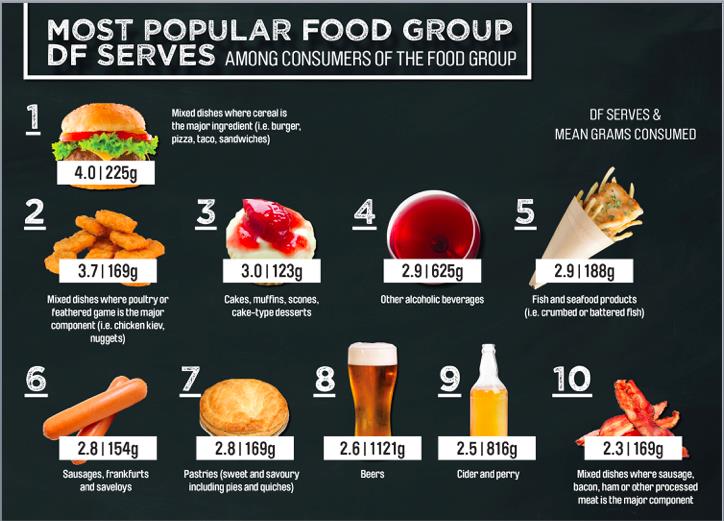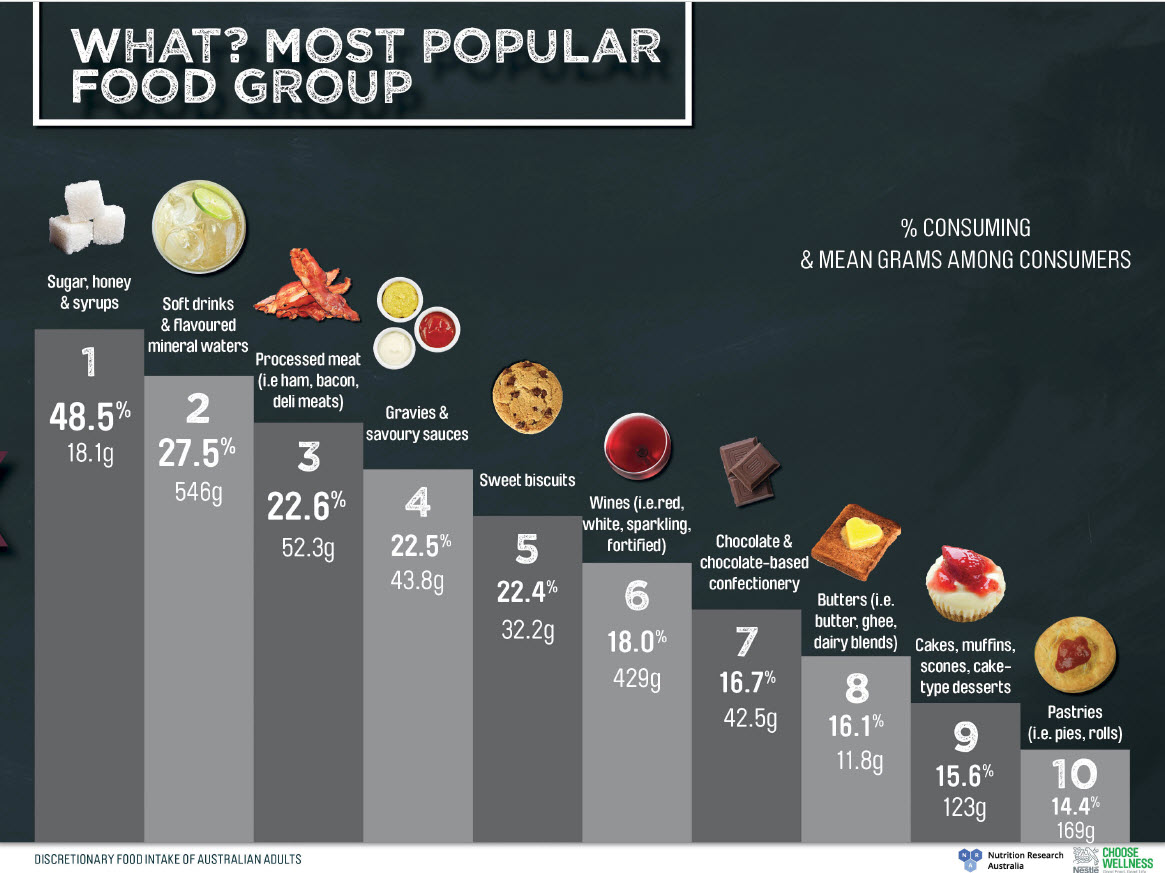- Home
- Blog
- Carbs, Sugars and Fibres
- Discretionary food overload?
Discretionary food overload?
Written by
on Wednesday, 08 June 2016.
Tagged: carbohydrates, carbs, fast food, fat, health, healthy eating, healthy lifestyle, junk food, nutrition, sugar

Basically, discretionary = junk. Everyone knows that ‘junk foods’ like sweet biscuits, cakes, pies, pasties, chips, crisps, pizza, nuggets and sugary drinks are not healthy. Yes, they add to life’s fun and enjoyment but should be eaten only in small amounts. Which, unfortunately, we don’t do!
As 67 per cent of adults are carrying too much weight, there’s huge debate about the right sort of diet to eat for weight loss. That’s why I thought it was timely to examine just how much, and what sort of, junk food we tuck into. Take a look, I think you’ll find it fascinating.
What are these discretionary foods?
We have lots of names for these sorts of foods – we call them ‘extras’ or ‘treats’. We tell our kids they are ‘Sometimes’ foods, not ‘Everyday foods’. Whatever you call them, you know the foods I mean. Dietitians have a technical term for them, calling them ‘Discretionary Foods’ or 'DF'.
They are foods and beverages that do not fit into one of the five basic food groups because they are not needed for health and growth. They tend to be poor in nutrients (vitamins, minerals, fibre, protein) and high in kilojoules/calories or energy so they get called “Energy-dense, Nutrient-poor” in many studies.
Now Nutrition Research Australia have independently conducted a secondary analysis of the 2011-12 National Nutrition and Physical Activity Study (which is part of the Australian Health Survey) conducted by the Australian Bureau of Statistics. Commissioned by Nestle Research, they found out exactly which ones and what types of discretionary foods are the most popular in Australia. Also which ones contribute the most to our already-high intake of sugars, salt, saturated fat and kilojoules. So it’s official! Here’s what they found:
- Most of us eat these foods each day. Almost 98 per cent of us consume discretionary foods and beverages daily.
- Men eat around 6 serves a day, while women eat around 4 serves a day. Even things you don’t think of as extras are included here such as that glass of wine with dinner or that bowl of salted chips watching the TV.
Consumption was highest amongst adults who:
- Are not physically active (so not good as you won’t be burning these off)
- Are overweight with a waist circumference or Body Mass Index or BMI that’s too big
- Are of lower socio-economic status
- Eat more overall (not surprising).
Which were the main culprits?
You won’t be surprised by the foods we consume most of. By sheer weight of food consumed, it’s those foods we eat in large amounts such as burgers, pizza, tacos, chicken nuggets, cakes, muffins and cake-type desserts (think sticky date pudding or cheesecake).
 Then there are wines, battered fish pieces, frankfurts/saveloys, pies, beers, ciders and sausage sandwich-type foods. See image and you’ll see the number of serves we consume together with their weight in grams.
Then there are wines, battered fish pieces, frankfurts/saveloys, pies, beers, ciders and sausage sandwich-type foods. See image and you’ll see the number of serves we consume together with their weight in grams.
However, if you look at what’s most popular, or the percentage of Aussies who eat them daily, you will see a different ranking of the top 10. Here they are in order and in the picture:
- Sugar, honey and syrups
- Soft drinks and flavoured mineral waters
- Processed meats (ham, bacon, salami)
- Gravies and sauces
- Sweet biscuits
- Wines
- Chocolate
- Butter *
- Cakes, muffins and cake-type desserts
- Savoury pastries and pies

* Butter along with dairy blends and ghee and are classified here as Discretionary Foods as they do not appear in any Core Food group such as Dairy or Meats. However, I don’t regard them as ‘extras’ so just ignore them on this list.
What’s the problem with these extras?
The trouble is that these discretionary foods provide little or no nutrients, and too many kilojoules or energy. In fact, they’re nicknamed ‘EDNP foods’ which translates to mean ‘Energy-Dense, Nutrient-Poor foods’, something we just don’t need in our overweight, sedentary world. Exactly as you’d suspect.
What’s more, they’re way high in sugars, sodium (a measure of salt) and saturated fat, which in many foods is adding to our heart disease problem. They are big contributors to our already-high intake of:
- Total sugars – 49 per cent comes from discretionary foods
- Sodium – 35 per cent comes from discretionary foods
- Saturated fat - 42 per cent comes from discretionary foods
These foods are the ones to get rid if you’re trying to lose weight. They give you little in the way of nutrients, are too easy to overconsume, are cheap and widely-available and stack on the kilojoules (Calories).
Guess which types of foods contribute the most to these three no-no’s?
- Savoury pastries and pies are the biggest foods to contribute to saturated fat.
- Sugary soft drinks and flavoured mineral waters contribute most to sugars, followed by sugar added to tea/coffee and in baking, then bought cakes and muffins, then chocolate.
- Processed meats (ham, bacon, salami) contribute most to sodium. Followed by gravies and sauces, pies, sausages and frankfurts.
Bottom line
We all eat way too much discretionary or junk food. Over one-third (35 per cent) of our intake now comes from them, which is not good for our collective waistlines or our nutrition.
If you’re not very active, are overweight, on a tight budget, on a low income, then cutting them right down is even more important. Pick ONE serve of something you really like and ditch the rest.
We need to reduce these to a bare minimum or at least halve what we eat now and return to those core foods that are needed for health and growth such as vegetables, eggs, fish, meats, nuts, dairy and whole grains.
So next time you’re contemplating a doughnut, muffin, soft drink or pie, think again and ask yourself: Is there something else I can buy instead? Aim for a sandwich, cheese with crackers, a nut-seed slice, tub of fruit salad, tub of yoghurt with water or a diet drink.
Alternatively once a week, introduce a day with NO JUNK FOOD at all. Check out the hashtags #DFFreeDinner or #NoJunk2day or #NoJunk4Dinner for inspo on Instagram and Twitter.
Save
Save
Save
Save
Jemma O'Hanlon
The Good Stuff
The Boring Stuff
© 2025 Foodwatch Australia. All rights reserved
Website by Joomstore eCommerce





